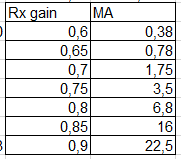Thanks a lot for your answer Derek.
2017-07-06 6:32 GMT-05:00 Derek Kozel <address@hidden>:
There's my doubt. I'm working over the Bastian's flowgraph of IEEE802.11a/g/p. Bastian put two slicers from 0 to 1 for Rx and Tx gain, the default value is 0.75. That's what i though the range of the gain was from 0 to 1, because it was normalized. In the USRP_source.cc they declare two functions:
usrp_source_impl::set_gain(double gain, const std::string &name, size_t chan)
{
void usrp_source_impl::set_normalized_gain(double norm_gain, size_t chan)
{
throw std::runtime_error("Normalized gain out of range, must be in [0, 1].");
}
If I try to put in the Gain of the block "2" then it appears:

So, the interval is normalized (between 0 to 1), that means the flowgraph is using the second function. But maybe i have to denormalize it in dB and later get the new signal.
I'm going to write you again, if I found how the mathematical relation is build.
Hello Christian,The RX gain value controls the analog gain of the USRP's receiver. If you run uhd_usrp_probe on the command line you will see lines such as the following which show the gain range and step size:
| | | RX Dboard: A
| | | ID: TwinRX v1.0 (0x0091)
| | | _____________________________________________________
| | | /
| | | | RX Frontend: 0
| | | | Name: TwinRX RX0
| | | | Antennas: RX1, RX2
| | | | Sensors: lo_locked
| | | | Freq range: 10.000 to 6000.000 MHz
| | | | Gain range all: 0.0 to 95.0 step 1.0 dB
I run it and, as you indicated, the values are in that range.
For every dB of gain you add at the frontend you should see a 1 dB increase in signal power amplitude. I recommend using uhd_fft or the USRP source, Frequency Sink, and a Range widget controlling RX gain to look directly at the signal. This should give you an intuitive sense of how RX gain affects your signal amplitude.
There's my doubt. I'm working over the Bastian's flowgraph of IEEE802.11a/g/p. Bastian put two slicers from 0 to 1 for Rx and Tx gain, the default value is 0.75. That's what i though the range of the gain was from 0 to 1, because it was normalized. In the USRP_source.cc they declare two functions:
usrp_source_impl::set_gain(double gain, const std::string &name, size_t chan)
{
...
}void usrp_source_impl::set_normalized_gain(double norm_gain, size_t chan)
{
...
if (norm_gain > 1.0 || norm_gain < 0.0) {throw std::runtime_error("Normalized gain out of range, must be in [0, 1].");
}
....
}If I try to put in the Gain of the block "2" then it appears:

I'm going to write you again, if I found how the mathematical relation is build.
However, if you have an idea of how it could look, I would be very grateful if you let me know.
Thanks for your time.
Best regards,
Cristian
From your table it looks like you are trying to change the RX gain in steps smaller than the USRP supports.This document looks like a quick intro to power and voltage changes with dB.
https://neurophysics.ucsd.edu/courses/physics_120/A% 20Practical%20Guide%20to% 20Decibels.pdf On Wed, Jul 5, 2017 at 10:24 PM, Cristian Rodríguez <address@hiddencom > wrote:______________________________I'm doing the next experiment:Hi all.I'm trying to understand how Rx gain, the paremeter that is set in the USRP Source block, affects the input signal. I would like to have an equation for that.
- I take the input signal from the USRP Source block to a MAG^2 block.
- From MAG^2 block to a moving average with a window of 50K.
- My sample rate is 10M that means that my moving average is calculated over 5ms.
- I'm sending a signal from a transmitter each 5ms.
- Finally I capture the value of the moving average, which is always around an average value.
Now, I change Rx gain and it is what i get:
The value of the output of the moving average is changing very strange. I was trying to write an equation for that, but i wasn't able, i used Rx gain in dB, in dBm as a constant, but i wasn't able to build a relation. In an equation i'm doing as follow:
Then I think that if I include Gtx, my equation results in:
But that doesn't make sense with the data that I get.
I would really greatful if someone can explain where is my mistake.
Thanks in advance.
Best regards,
Cristian
_________________
Discuss-gnuradio mailing list
address@hidden
https://lists.gnu.org/mailman/listinfo/discuss-gnuradio


